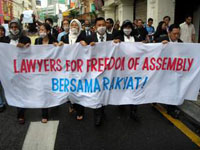18 December 2007
Sixty-second General Assembly
Plenary
76th & 77th Meetings (AM & PM)
GENERAL ASSEMBLY ADOPTS LANDMARK TEXT CALLING FOR MORATORIUM ON DEATH PENALTY
Adopts 54 Resolutions, 12 Decisions Recommended by Third Committee
The General Assembly today adopted 54 resolutions and 12 decisions recommended by its Third Committee (Social, Humanitarian and Cultural), including a landmark text
calling for a moratorium on executions to be established in all States that still maintain the death penalty, as well as a resolution strongly condemning rape against women and girls in all its forms, including in conflict situations.
The resolution calling for “a moratorium on the death penalty”, was passed by a vote of 104 in favour to 54 against, with 29 abstentions. (See annex VI.) It called on all States that still allowed capital punishment to “progressively restrict the use of the death penalty and reduce the number of offences for which it may be imposed”. Those countries were also called on to provide the Secretary-General with information on their use of capital punishment and to respect international standards that safeguard the rights of condemned inmates.
Echoes of the intense two-day debate that preceded approval in the Committee of the resolution on a moratorium on executions reverberated in the Assembly hall, with a number of delegations arguing that the death penalty was not illegal under international human rights legislation and that it was the sovereign right of each and every State to determine its own judicial system. Two similar proposals had reached the Assembly in 1994 and 1999; in the first case, it was defeated by eight votes, while in the second, it was withdrawn at the last minute.
Among those delegations opposing the resolution, the representative of Barbados said the European Union and other main sponsors were trying to impose their will on other countries. “Capital punishment remains legal under international law and Barbados wishes to exercise its sovereign right to use it as deterrent to the most serious crimes,” he said just ahead of the vote.
Singapore’s representative said it was unfortunate that the resolution’s co-sponsors had handled the issue not as a debate, but as a lecture. There had never been any attempt to reach consensus. They had ignored the diversity of States and their judicial systems. In addition, they had resorted to pressure tactics and demarches. While the co-sponsors would celebrate their victory, it had come at the expense of acrimony in the Third Committee. Each State had a sovereign right to choose its own political, criminal and judicial systems, he said, stressing that Singapore would continue to follow its own course in the matter..... (go to http://www.un.org/News/Press/docs/2007/ga10678.doc.htm for the rest of this document, the relevant annex showing the votes for this "moratorium resolution on the death penalty" is enclosed)
ANNEX VI
Vote on a Moratorium on the Use of the Death Penalty
The draft resolution on a moratorium on the use of the death penalty (document A/62/439/Add.2) was adopted by a recorded vote of 104 in favour to 54 against, with 29 abstentions, as follows:
In favour: Albania, Algeria, Andorra, Angola, Argentina, Armenia, Australia, Austria, Azerbaijan, Belgium, Benin, Bolivia, Bosnia and Herzegovina, Brazil, Bulgaria, Burkina Faso, Burundi, Cambodia, Canada, Cape Verde, Chile, Colombia, Congo, Costa Rica, Côte d’Ivoire, Croatia, Cyprus, Czech Republic, Denmark, Dominican Republic, Ecuador, El Salvador, Estonia, Finland, France, Gabon, Georgia, Germany, Greece, Guatemala, Haiti, Honduras, Hungary, Iceland, Ireland, Israel, Italy, Kazakhstan, Kiribati, Kyrgyzstan, Latvia, Liechtenstein, Lithuania, Luxembourg, Madagascar, Mali, Malta, Marshall Islands, Mauritius, Mexico, Micronesia (Federated States of), Moldova, Monaco, Montenegro, Mozambique, Namibia, Nauru, Nepal, Netherlands, New Zealand, Nicaragua, Norway, Palau, Panama, Paraguay, Philippines, Poland, Portugal, Romania, Russian Federation, Rwanda, Samoa, San Marino, Sao Tome and Principe, Serbia, Slovakia, Slovenia, South Africa, Spain, Sri Lanka, Sweden, Switzerland, Tajikistan, The former Yugoslav Republic of Macedonia, Timor-Leste, Turkey, Turkmenistan, Tuvalu, Ukraine, United Kingdom, Uruguay, Uzbekistan, Vanuatu, Venezuela.
Against: Afghanistan, Antigua and Barbuda, Bahamas, Bahrain, Bangladesh, Barbados, Belize, Botswana, Brunei Darussalam, Chad, China, Comoros, Democratic People’s Republic of Korea, Dominica, Egypt, Ethiopia, Grenada, Guyana, India, Indonesia, Iran, Iraq, Jamaica, Japan, Jordan, Kuwait, Libya, Malaysia, Maldives, Mauritania, Mongolia, Myanmar, Nigeria, Oman, Pakistan, Papua New Guinea, Qatar, Saint Kitts and Nevis, Saint Lucia, Saint Vincent and the Grenadines, Saudi Arabia, Singapore, Solomon Islands, Somalia, Sudan, Suriname, Syria, Thailand, Tonga, Trinidad and Tobago, Uganda, United States, Yemen, Zimbabwe.
Abstain: Belarus, Bhutan, Cameroon, Central African Republic, Cuba, Democratic Republic of the Congo, Djibouti, Equatorial Guinea, Eritrea, Fiji, Gambia, Ghana, Guinea, Kenya, Lao People’s Democratic Republic, Lebanon, Lesotho, Liberia, Malawi, Morocco, Niger, Republic of Korea, Sierra Leone, Swaziland, Togo, United Arab Emirates, United Republic of Tanzania, Viet Nam, Zambia.
Absent: Guinea-Bissau, Peru, Senegal, Seychelles, Tunisia.
 Parental pain: Mohamad Lazim and Umi Slaia looking at their daughter’s picture at their house near Pasir Puteh recently. They got to meet her yesterday. — Bernam
Parental pain: Mohamad Lazim and Umi Slaia looking at their daughter’s picture at their house near Pasir Puteh recently. They got to meet her yesterday. — Bernam  Umi Azlim: Allowed to see her parents for 30 minutes
Umi Azlim: Allowed to see her parents for 30 minutes 

 ©
©
 The group said the ACA must investigate Environment Minister Azmi Khalid (photo) and former Department of Wildlife and National Parks DG Musa Nordin, who retired last October, for abuse of power.
The group said the ACA must investigate Environment Minister Azmi Khalid (photo) and former Department of Wildlife and National Parks DG Musa Nordin, who retired last October, for abuse of power. Surendran referred to a news article published by the Star on Sept 11, where Musa admitted he was “indirectly involved” in the monkey trade.
Surendran referred to a news article published by the Star on Sept 11, where Musa admitted he was “indirectly involved” in the monkey trade. The Malaysian Bar at its AGM last March passed a resolution declaring that the corporal punishment of whipping is cruel, inhumane and degrading and called for its abolishment. Human rights lawyer Renuka T. Balasubramaniam produces compelling and cogent reasons why all Malaysians should declare whipping barbaric.
The Malaysian Bar at its AGM last March passed a resolution declaring that the corporal punishment of whipping is cruel, inhumane and degrading and called for its abolishment. Human rights lawyer Renuka T. Balasubramaniam produces compelling and cogent reasons why all Malaysians should declare whipping barbaric. ©
© "Without a written judgement, we can't appeal," Karpal Singh (photo), Jambol's lawyer and prominent human rights campaigner, told IPS.
"Without a written judgement, we can't appeal," Karpal Singh (photo), Jambol's lawyer and prominent human rights campaigner, told IPS. "Their lackadaisical attitude has hamstrung the administration of justice to people who need it the most," DAP lawmaker M Kulasegaran said.
"Their lackadaisical attitude has hamstrung the administration of justice to people who need it the most," DAP lawmaker M Kulasegaran said.
 The Council plans to present Chief Justice Ahmad Fairuz Sheikh Abdul Halim with a list of serious cases. The hope is that offending judges will be penalised, a sanction that might finally end such torment.
The Council plans to present Chief Justice Ahmad Fairuz Sheikh Abdul Halim with a list of serious cases. The hope is that offending judges will be penalised, a sanction that might finally end such torment.